How Tobias Menzies Traveled Back in Time to Hunt Lincoln's Killer
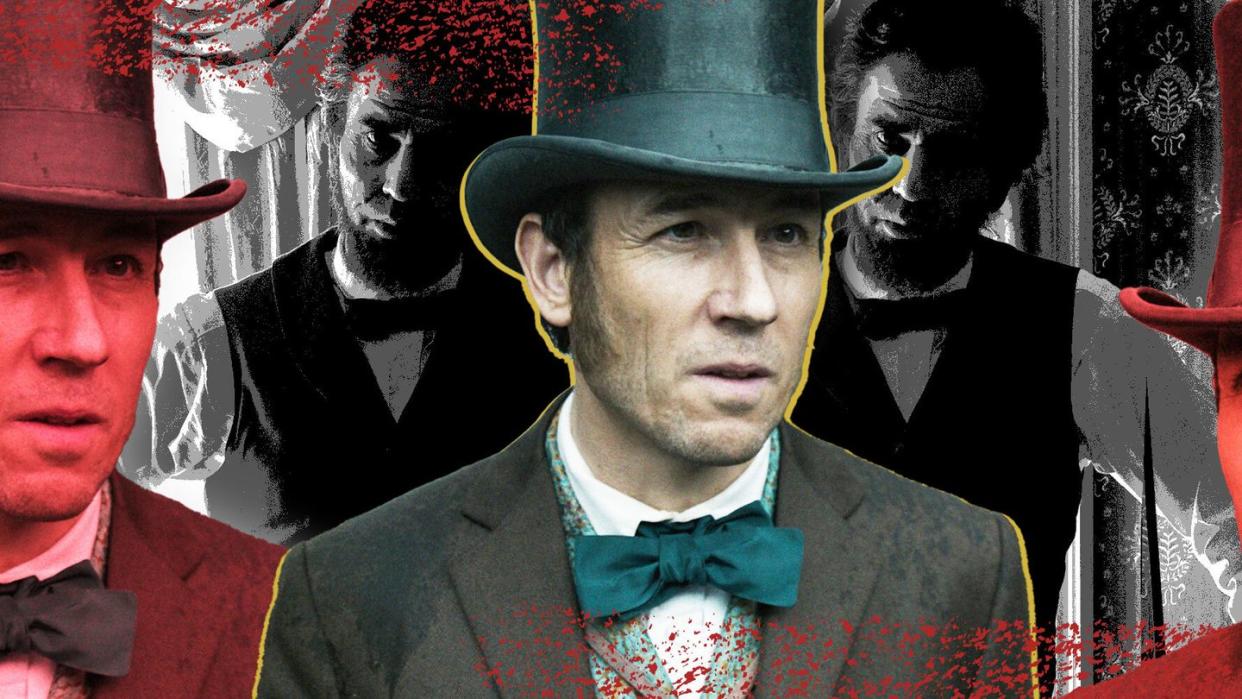
"Hearst Magazines and Yahoo may earn commission or revenue on some items through these links."
WHEN IT COMES to inhabiting new and interesting worlds, Tobias Menzies is a veteran. Some may remember his time in Westeros, showing up as the competent but never-all-the-way-respected Lord Edmure Tully in 9 episodes of Game of Thrones. Others may recall his Emmy-winning turn as part of the aristocracy, playing Prince Philip for two seasons on Netflix's The Crown, or his time aboard the spooky HMS Erebus in AMC's The Terror. Hell, just last year he ventured into the oft-explored-but-still-intriguing waters of Manhattan's Upper West Side to play opposite Julia Louis-Dreyfus in A24's intimate relationship dramedy You Hurt My Feelings.
Menzies has been all over the place, and his latest project once again takes him somewhere else entirely: the 1860s United States of America, specifically the days just after President Abraham Lincoln's assassination in 1865. In Manhunt, Apple TV+'s new limited series based on the best-selling nonfiction book of the same name, the 50-year-old actor plays Secretary of War Edwin Stanton, who finds himself leading the hunt for infamous presidential assassin John Wilkes Booth.
Stepping into 1865 America isn't quite the same as showing up in Game of Thrones, or assuming a position within the ranks of Buckingham Palace, but Menzies goes through the same process every time, no matter if he's going into a world being adapted from a fantasy, horror, or nonfiction book.
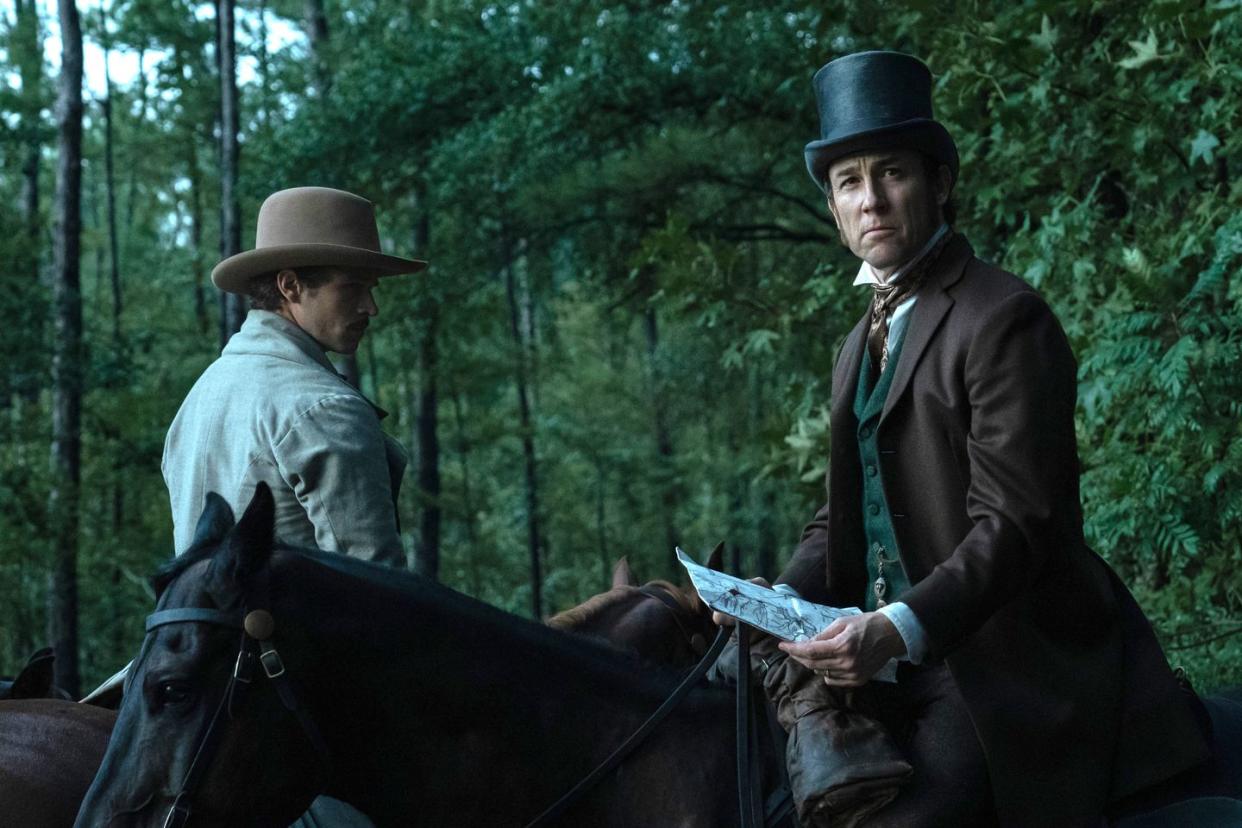
In fact, he hardly sees a difference at all. "It’s not quite as clear cut as that," he says over Zoom, noting that it's his responsibility to make the exceptional seem unexceptional, whether that's a character who lives among dragons or one who works with Abe Lincoln. "These are flesh and blood people, with very human needs and concerns, and what draws us through a story is those connections—those things you can understand over time."
There's got to be something to it, though, right? Menzies bounces between worlds like it's nothing; if anyone is great at grounding a character—one from any world—in a relatable story, it's him. But he's not about to reveal it before we head into the journey.
"I’d be giving away my secrets then," he says with a laugh.
Men's Health spoke to Menzies about traveling back in time, telling a not-particularly-well-known story of such a vital point in U.S. history, and working alongside Brad Pitt in Apple's upcoming F1 movie.
MEN'S HEALTH: The Manhunt book is super interesting. What drew you to this specific moment in American history?
Tobias Menzies: The simple answer is that it’s a rather remarkable story. It’s one I knew the bare, basic details of, but a lot of it I was not aware of, and I suspect a lot of audience watching will have a lot to find in this story. That was the big first draw.
Also, at the heart of it is a really interesting man—someone I didn’t know about—in Edwin Stanton. The chance to bring this story, an important story in America’s history, to a new audience felt like an exciting endeavor.
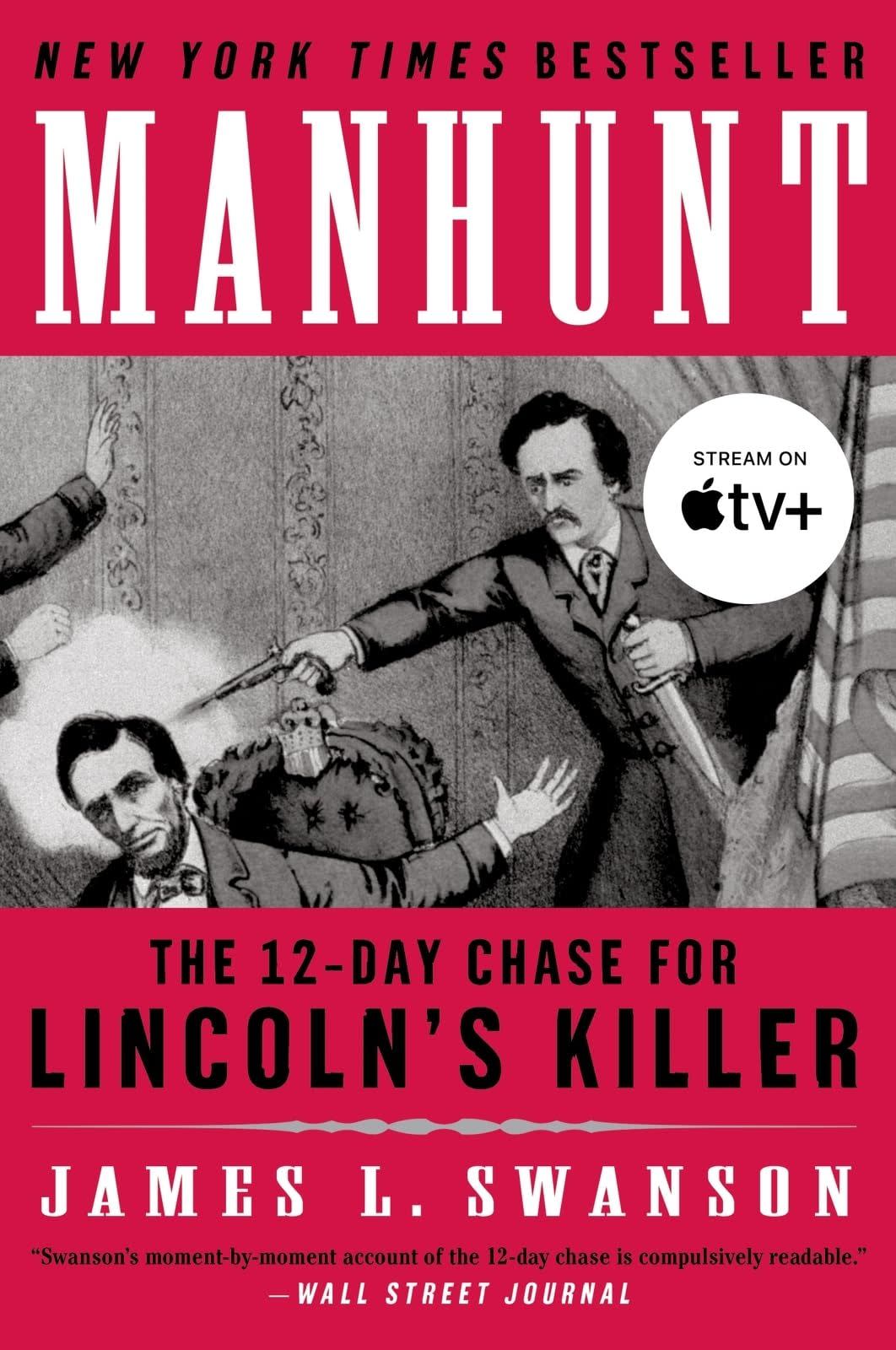
Manhunt: The 12-Day Chase for Lincoln's Killer: An Edgar Award Winner (P.S.)
amazon.com
$11.99
MH: Did you read the book?
TM: Sure. Yeah. What’s great about the book is its deftness, and its thriller quality. It’s a very dynamic read, and I hope we’ve managed to keep some of that in the show. Obviously, it’s primarily a true-crime thriller, the book and the show as well, but I think [showrunner Monica Beletsky] also tried to fold in some of the politics that were revolving around that assassination.
MH: How did you explore some of the more subtle differences between the 1860s and present day?
TM: I certainly read into the history and the world. In a way, it’s hard to know about expression, or physical expression, or how they move, because we don’t have any record of that. But one of the books I really enjoyed reading was Team of Rivals, which is about Lincoln’s cabinet during the Civil War, and Edwin Stanton is featured in that. What was interesting about that is the nature of argument, and the politicians were larger than life. That cabinet in particular… he brought together some very disparate and very disputatious figures, and got them to work together. Stanton was an important cog in that machine.
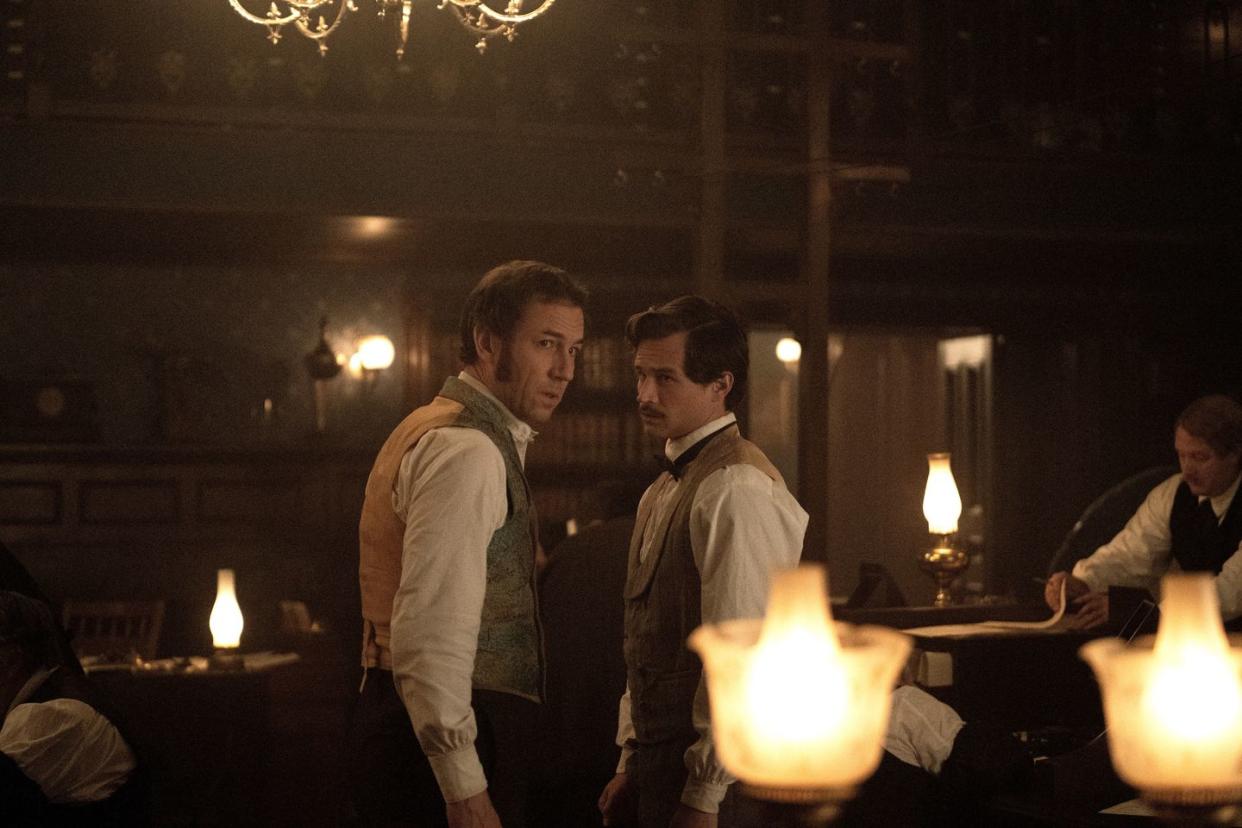
MH: The show also does a good job exploring Lincoln and Stanton's friendship. How much emphasis did you put on that relationship?
TM: It was quite a long journey. I mean, they first met before Lincoln became President, when he was a Springfield lawyer, and Stanton was a very considerable lawyer in his own right. I know there are reports of Lincoln going to see Stanton’s work as a lawyer, his advocacy.
When Stanton first met Lincoln, he didn’t think much of him. He thought he was a countryside hick, in a way, but by the time the story starts, and Lincoln is killed, by this point, for Stanton, those thoughts are completely gone. We have both a huge respect politically—Stanton comes to understand Lincoln’s genius, and his ability to bring people together and build consensus—and, yes, they’ve also become friends. So, part of what the show is wrestling with is a man who’s got to both hold a country together, but also grieve a friend.
MH: I love when Stanton refers to Lincoln as “Abe.” It’s a small thing, but we don’t hear Abraham Lincoln referred to on a first-name/nickname basis very often.
TM: That doesn’t change through the ages. If you’re close to someone, you shorten their name, or use a patronym. I’m sure that was through to them, too. Lincoln calls Stanton ‘Mars,’ he was the Secretary of War. I think those things are a shorthand to getting a sense of what their relationship was.
MH: How do you most relate to this character? Is it difficult to go back almost 200 years and find a connection?
TM: I don’t think men and women have changed hugely over time. Certainly the clothes change, and the times around them change, but people are still husbands, and fathers, and children, and parents, and they still eat, and they still need friendship. So, all of those human qualities are quite universal, and you have to build those up so that it’s a relatable story. He’s a man in an extraordinary situation, and to see him try to navigate that is what’s interesting. I tried to relate who he was, and what he was dealing with on a personal level, as much as possible.
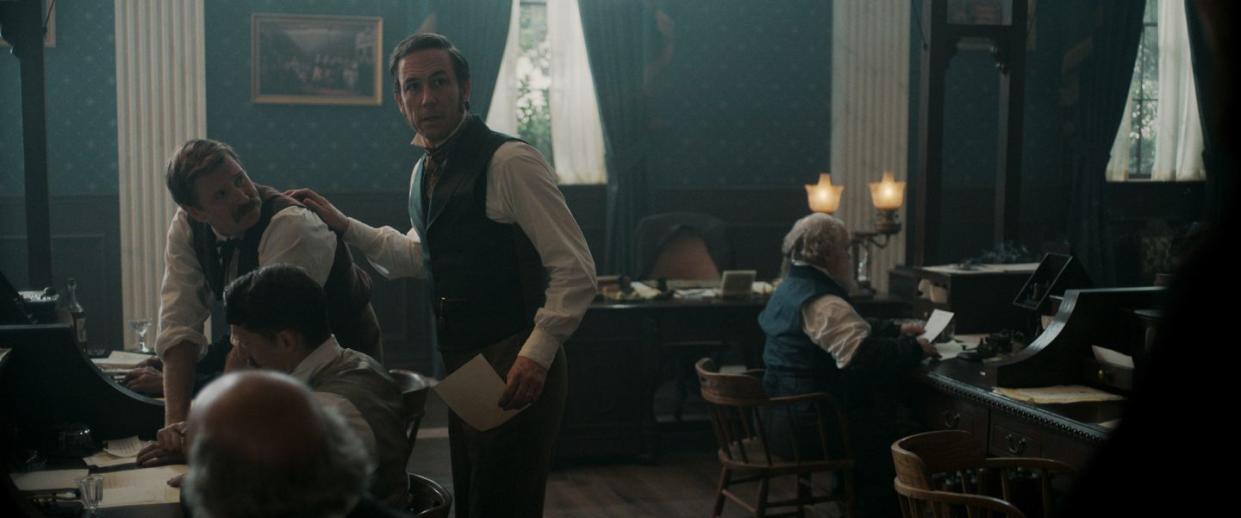
MH: How did you try to balance the professional and private parts of Stanton’s life together?
TM: I think the argument of the show is that he doesn’t get the balance very right. He’s neglectful of his family during this period, and you see someone who’s consumed by the attempt to salvage both their political legacy, and find some justice for his friend, to the detriment of his marriage in the show. His wife leaves, and certainly he’s not the kindest of fathers. I think you see someone not entirely getting the balance right, and put in a position of a great extremist.
MH: You spent time in the 1860s for this project. What was that transformation like?
TM: The clothes do a lot. Sometimes, I would curse them, because we were shooting in Savannah, Georgia, and it was very humid, so I certainly didn’t want to wear waistcoats, and hats, and coats [Laughs]. The production design, and costume design, is a huge part of bringing that story to life, and it’s hugely helpful to us actors each day.
MH: What kind of physical preparation was involed?
TM: He was an asthmatic, at a time when it was a hard condition to have. This is pre-inhalers. So, that runs as a physical challenge through the story, and I had to do a bit of research into that what that feels like, and is for someone. It’s something he lived with, and through the story, in a way, he’s risking his own health as well as he tries to salvage this almost impossible situation.
MH: Is there any record of how they treated asthma back then?
TM: There’s a lot of steaming, and stuff, but they didn’t really have a medicinal solution to it yet.
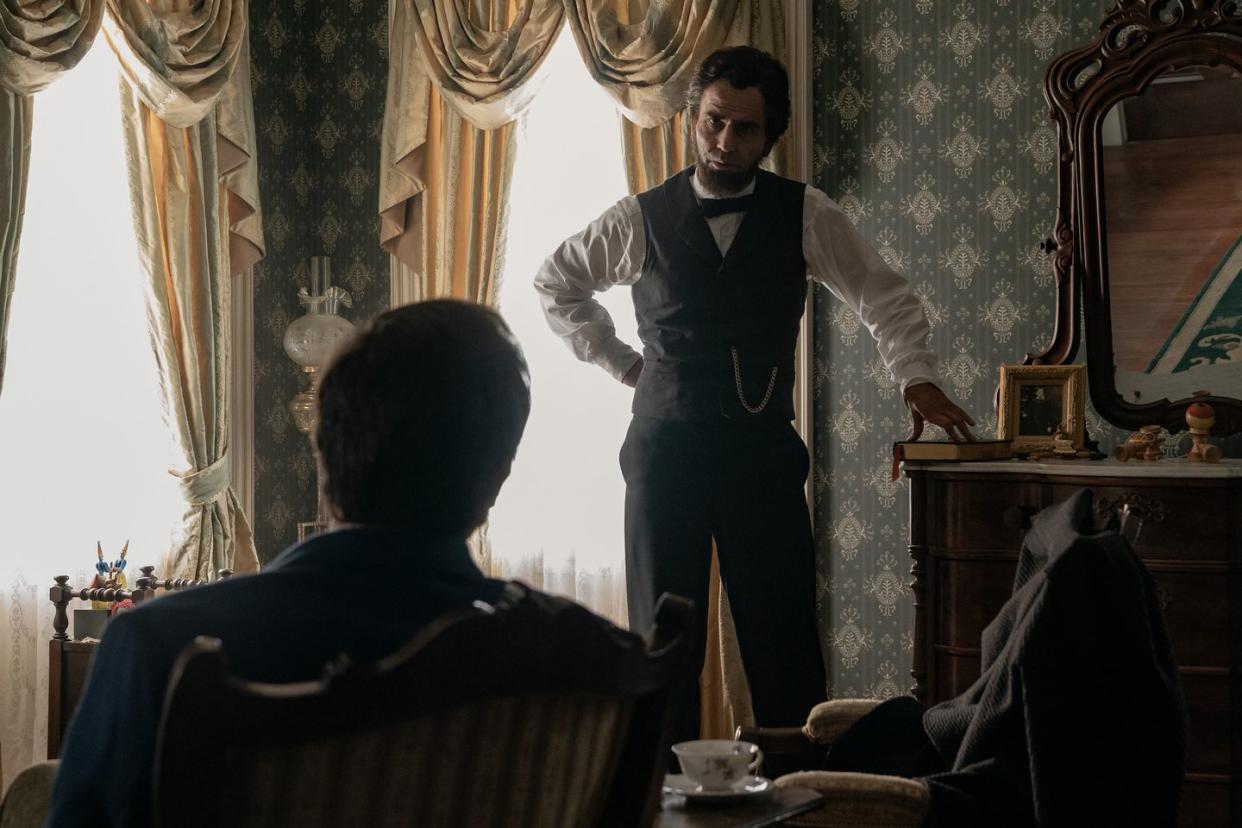
MH: What was it like sharing scenes with Hamish Linklater, who has just seemingly completely transformed into the larger-than-life figure that is Abraham Lincoln?
TM: Lincoln obviously is at the heart of this story, and we discover the friendship through flashback, because the story starts with his death. We were very lucky to have Hamish come and play him for us, and he does a brilliant job. I really enjoyed working with him—I had not filmed with him before, and he’s great company and a fantastic actor, so I always looked forward to doing those scenes. In a way, that relationship and that character, and the sense and energy and heart of that man is the emotional heart of the whole story.
MH: Is there any difference in approach as you’re going into 1865 compared to going into Westeros?
TM: The answer is no. Not really. It’s all the same muscles. It’s acting, it’s looking the other person in the eye and meaning it. Delivering certain ideas, or feelings, or thoughts. So, whether it’s in the imagined hall in Game of Thrones, or in a room in 1860, as I say, human behavior is quite consistent over time. That is the currency of acting—behavior, human psychology, wants, needs, what are they trying to get? What don’t they have? All these drives and muscles are true to all the different scenarios, whether it’s Prince Philip in Buckingham Palace or Stanton in the War Room.
MH: Speaking of going to kind of another world… your upcoming film with Brad Pitt sounds like it’ll be Top Gun: Maverick, but with Formula 1 cars. Can you tell us anything about it?
TM: The honest answer is that I think I can’t talk about it. I think I’m embargoed. I remember talking to someone a while back, and saying something about it, and and I got in quite a bit of trouble [Laughs]. I haven’t finished doing it yet… I’m going back. We obviously got interrupted by the strike, so I’m going back to do some more, and I’ve really been enjoying it. But I can’t really say much about it.
MH: Can I ask you tangentially, then, about F1—are you interested in that sport?
TM: In complete honesty, no. It’s not a sport that I’m very engaged in. But we shot some stuff at Silverstone last year, and it’s a crazy circus. It was pretty lively, so… yeah [Laughs]. It’s a crazy world.
This interview has been condensed for content and clarity.
You Might Also Like
